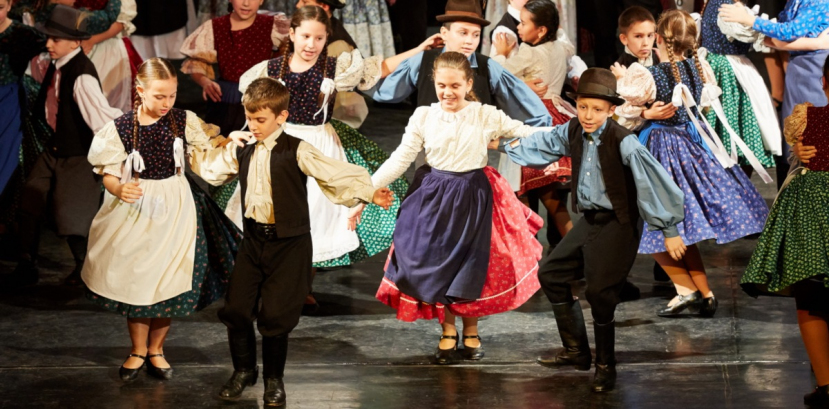In the Borsod-Abaúj-Zemplén comitatus (county), close to the Slovakian border, lies a town of Sátoraljaújhely (population approx. 17,000). After the Tartars destroyed the town in the 13th century, it was rebuilt, with the original name of sátor-alja (meaning ‘under a tent’ and a reference to a nearby tent-shaped hill) being extended to include an extra element of új hely (meaning ‘a new place’).
Sátoraljaújhely is the home town of children’s folk dance group ÖRDÖGSZEKÉR, which is affiliated with the Bokréta Art School. The ensemble’s aim is to preserve traditional, local dances and customs from the region of the Zemplén mountains. It actively participates in competitions, including dance couple contests. Its repertoire encompasses both authentic, ancient choreographic acts and contemporary stage interpretations. The ensemble also performs dances from all over the Pannonian Basin.
The Festival audience will have an opportunity to see typical girls’ dance games from the region of Hegyköz, as well as children’s games traditionally played outside the village and involving everyone. Some customary activities include funny elements, e.g. a men’s initiation rite, where boys are made to dance with their hands and legs tied. Of course, the programme would not be complete without the traditional dance of verbunk. Since gypsies have significantly contributed to the ethnic flavour of the region, their dances will also feature in the programme, being followed by shepherd’s dances. As the programme progresses, the instruments will change as well, thus illustrating the historical transition from simple everyday objects used for musical purposes to real musical instruments (featuring at the end of the programme).
János Fehér is the ensemble leader, instructor and choreographer. The musical band, headed by Peter Tőrők, will be playing violins, a viola, a double bass, a cimbalom and a clarinet.
Sátoraljaújhely is the home town of children’s folk dance group ÖRDÖGSZEKÉR, which is affiliated with the Bokréta Art School. The ensemble’s aim is to preserve traditional, local dances and customs from the region of the Zemplén mountains. It actively participates in competitions, including dance couple contests. Its repertoire encompasses both authentic, ancient choreographic acts and contemporary stage interpretations. The ensemble also performs dances from all over the Pannonian Basin.
The Festival audience will have an opportunity to see typical girls’ dance games from the region of Hegyköz, as well as children’s games traditionally played outside the village and involving everyone. Some customary activities include funny elements, e.g. a men’s initiation rite, where boys are made to dance with their hands and legs tied. Of course, the programme would not be complete without the traditional dance of verbunk. Since gypsies have significantly contributed to the ethnic flavour of the region, their dances will also feature in the programme, being followed by shepherd’s dances. As the programme progresses, the instruments will change as well, thus illustrating the historical transition from simple everyday objects used for musical purposes to real musical instruments (featuring at the end of the programme).
János Fehér is the ensemble leader, instructor and choreographer. The musical band, headed by Peter Tőrők, will be playing violins, a viola, a double bass, a cimbalom and a clarinet.

